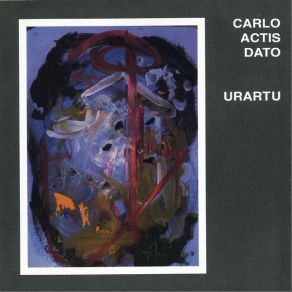Urartu
Download links and information about Urartu by Carlo Actis Dato. This album was released in 1994 and it belongs to Jazz, Avant Garde Jazz genres. It contains 16 tracks with total duration of 59:45 minutes.

|
|
|---|---|
| Artist: | Carlo Actis Dato |
| Release date: | 1994 |
| Genre: | Jazz, Avant Garde Jazz |
| Tracks: | 16 |
| Duration: | 59:45 |
| Buy it NOW at: | |
| Buy on iTunes $11.04 | |
Tracks
[Edit]| No. | Title | Length |
|---|---|---|
| 1. | Amenhotep | 5:39 |
| 2. | Poulet Fume | 4:55 |
| 3. | Pigiami Firmati | 1:22 |
| 4. | Yazilikaya | 5:13 |
| 5. | Ajame | 4:52 |
| 6. | Nemrod Dagi | 4:12 |
| 7. | Gioia Dei Bimbi | 5:08 |
| 8. | La Luna Laggiu | 3:22 |
| 9. | Autumn Leaves | 3:51 |
| 10. | 10 000 000 + Iva Chiovi Un Mano | 2:51 |
| 11. | Commagene, The King | 5:25 |
| 12. | Duck's Dance | 2:05 |
| 13. | Round Midnight | 4:30 |
| 14. | Tahi | 2:32 |
| 15. | Dado, The Dog | 1:56 |
| 16. | Chanson De La Pleine Lune | 1:52 |
Details
[Edit]Italian reedist Carlos Actis Dato, the "man from Milan," as he is known among European free jazz fans, is well known as one of the principals in the Italian Instabile Orchestra and as a soloist who leads a group called the Atipico Trio. Despite appearing on over 35 releases, this is his first solo recording. Principally consisting of improvisations on baritone saxophones and bass clarinets — though there are a few tenor pieces tossed in — Actis Dato is reminiscent in his playing manner of Evan Parker, whose modalities and sound sheets are the overlay by which he conducts his investigations. It's true that he doesn't carry Parker's fire — no one does — but he does dig deep into the notion of polyphony that Parker ascribes to, or, shall we say, the illusion of polyphony, unless microphonics count, but that's for the music scholars to argue. There is also a deeper blues sensibility that seems to come equally from the horns of Hamiett Bluiett and Pepper Adams in Actis Dato's playing. His flurries of harmonic exchange in the mirror of interval and arpeggio are certainly in Bluiett's style, but his flow, the glide from one idea to the next so seamlessly, is out of the Adams technique book. There are 16 pieces here, 15 of them original improvisations that express the cry of the reedist own voice as he seeks resolutions to questions of esthetic expression and harmonic trickery. His voice is passionate and humorous and the playfulness in it is not a disguise for anything or its lack — however, his insistence on wearing of a gigantic Donald Duck mask in performance may be something other than a Fluxus statement. But the two most revealing moments on this very satisfying solo debut come during the brief "Pigiami Firmati," where he uses Gerry Mulligan's arpeggio style and inverts it for the sake of harmony and comes at the melody he has created sideways playing it from the inside out, and on the microtonal experiment "Yazilikaya," in which long tones are breathed into the horn and then superimposed via circular breathing with other ones, producing a microphonics of tone rather than just of notes. The fact that layered on top, without overdubbing, are soloing intervals of scalular depth and complexity, makes the piece seem like a technical impossibility in the first place and an emotional wonder in the second. And finally, as if to prove that improvising is not his only strength, Actis Dato does a gorgeous if irreverent reading of "'Round Midnight." He uses the melody to extrapolate tonal fragments necessary to its architecture and carry them over into a different set of pitches to produce a counter melody that mirrors the original. It is deft, complex, and soulful. Urartu is a solo debut that has more than its share of quirks and surprises — some of them unpleasant — but it holds great delight and deep interest for the listener of modern improvised music. This is a fine debut with a few rough spots; if Actis Dato continues in his present direction, his next solo album should be a monster.